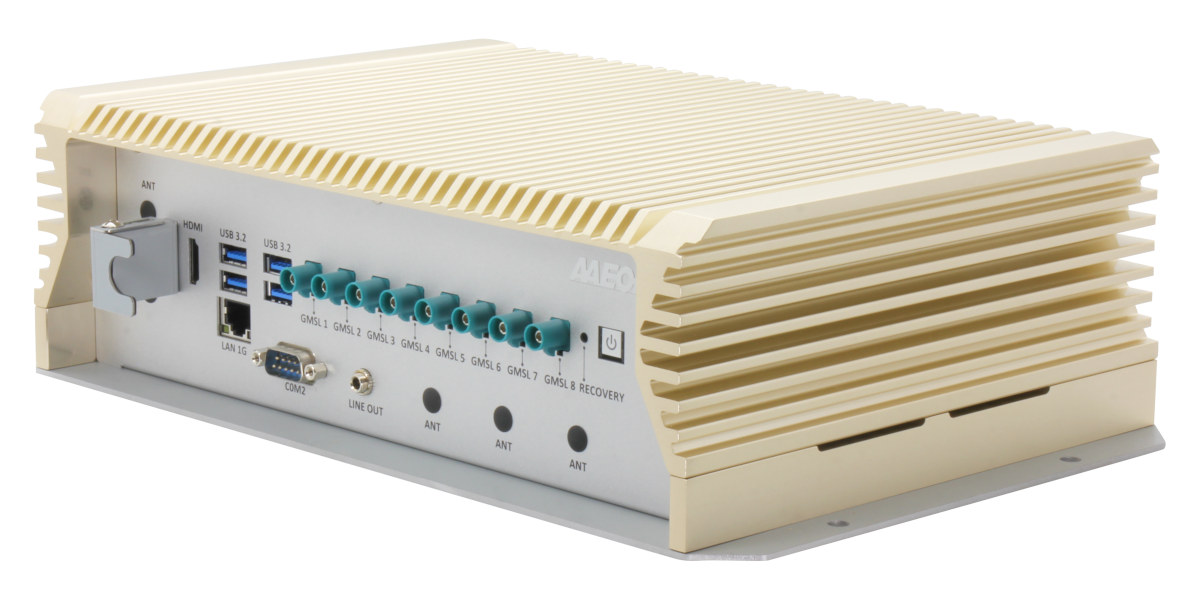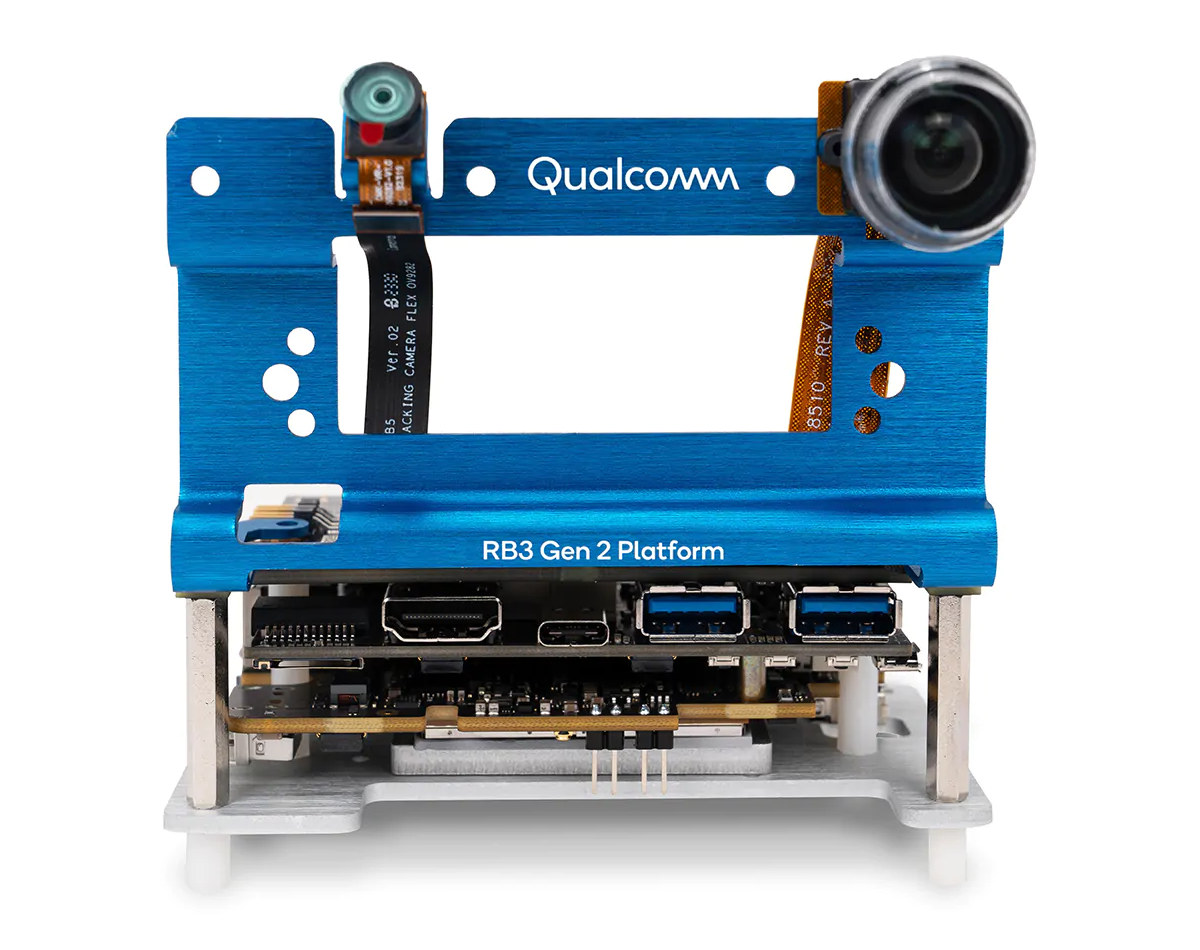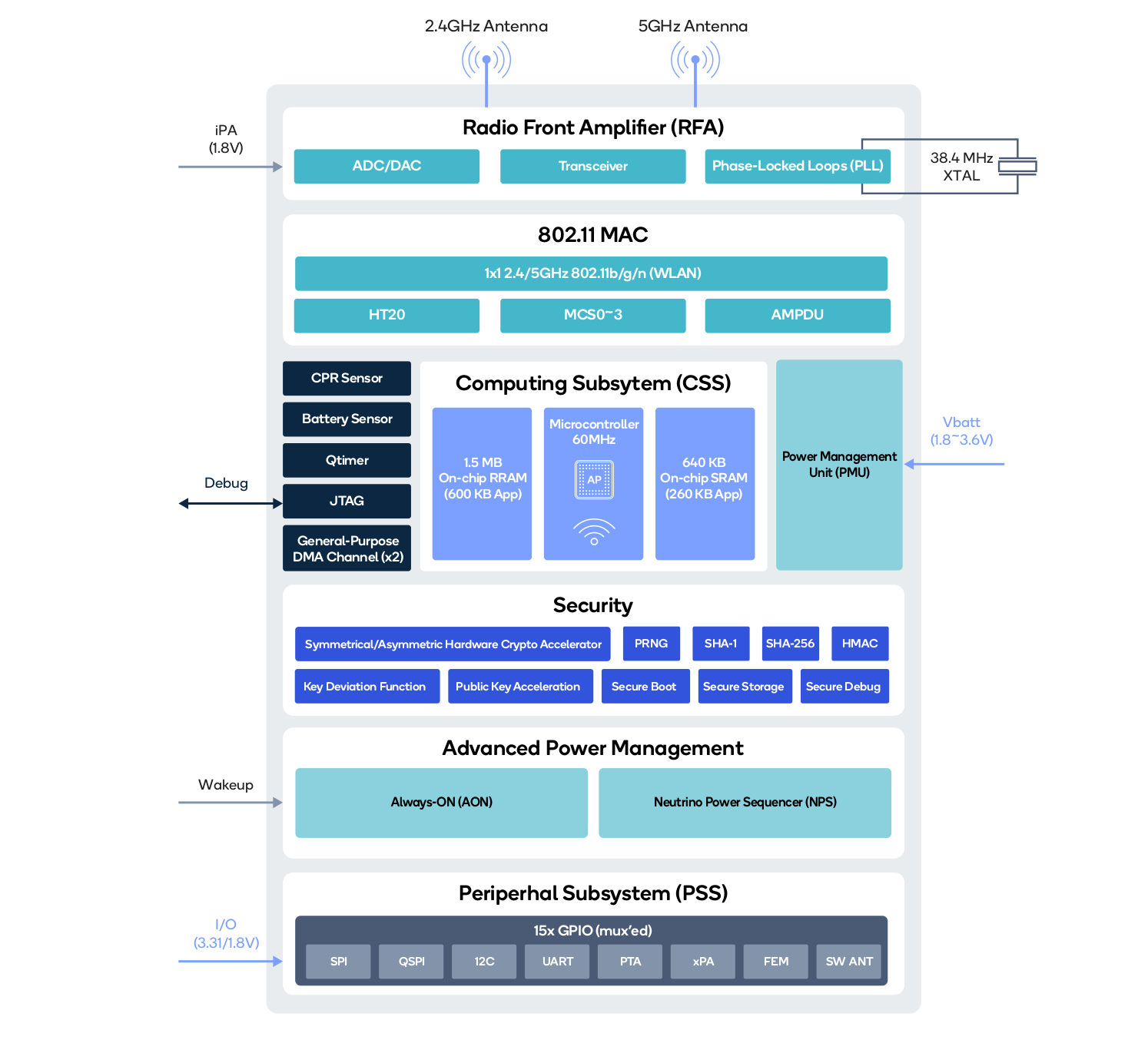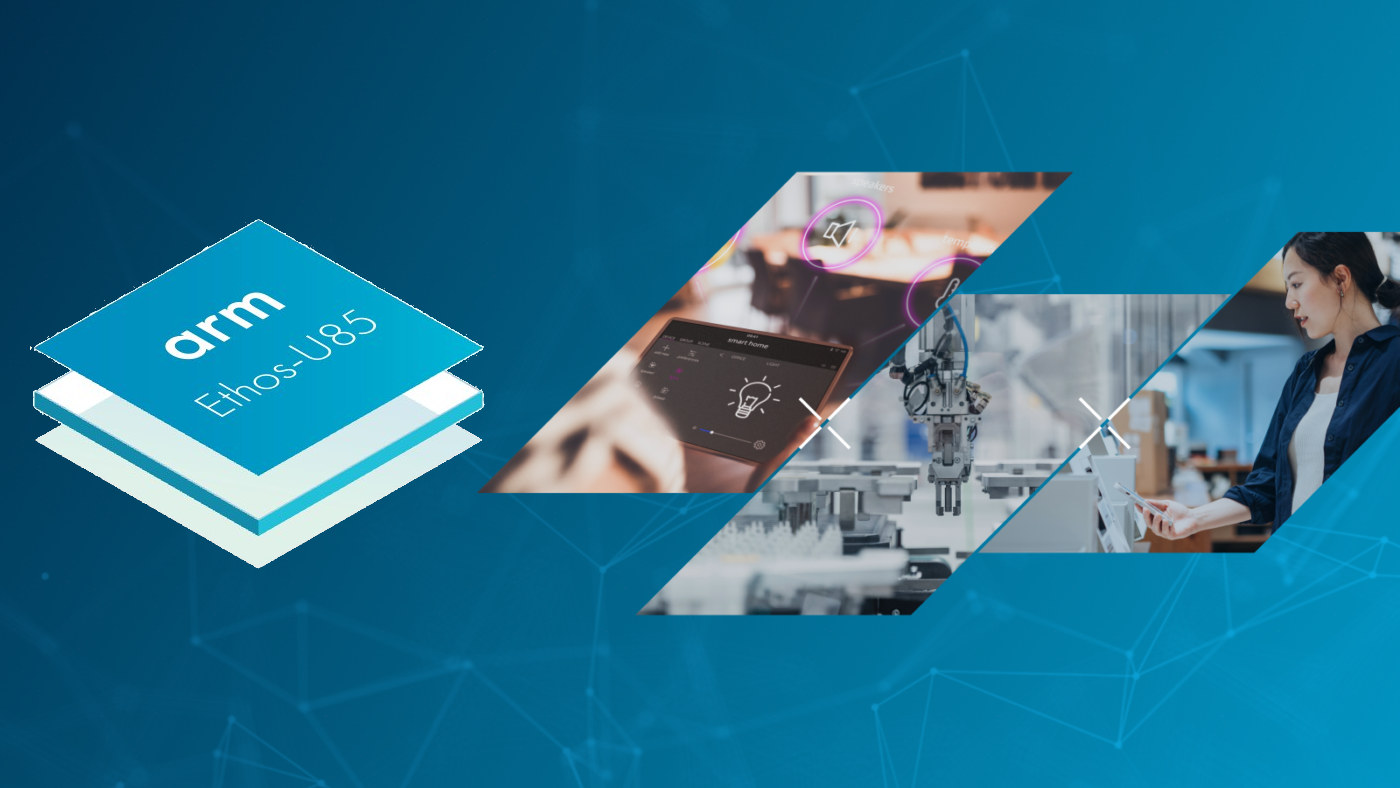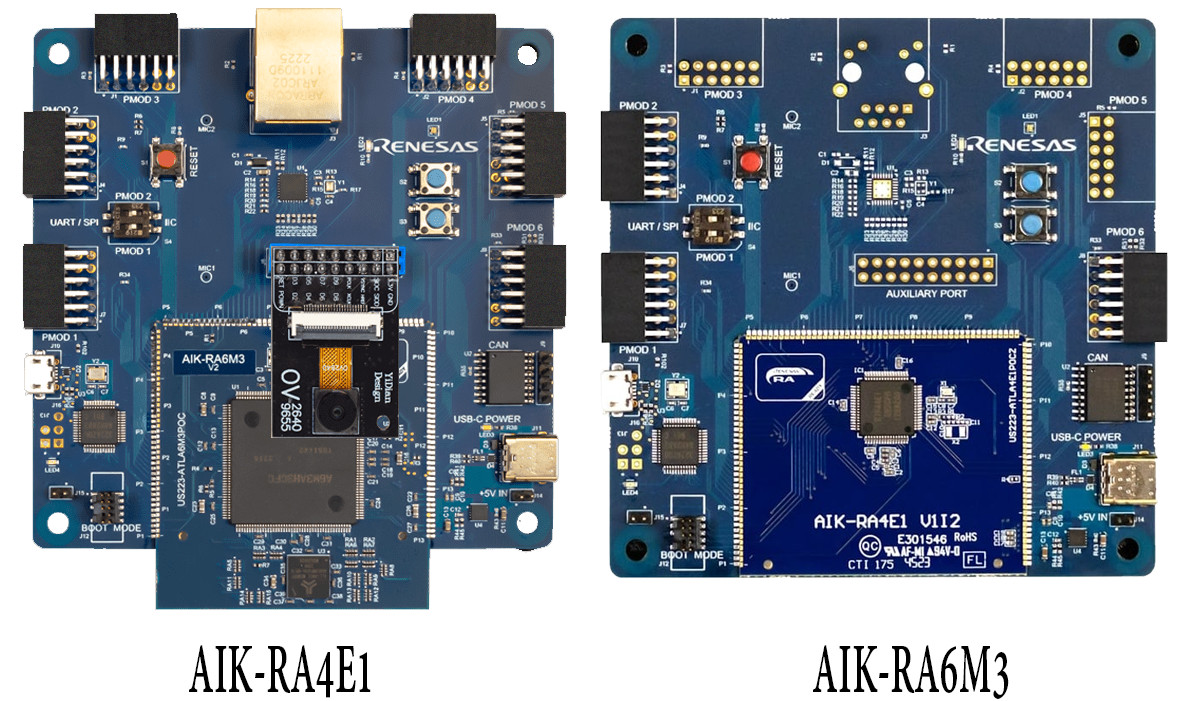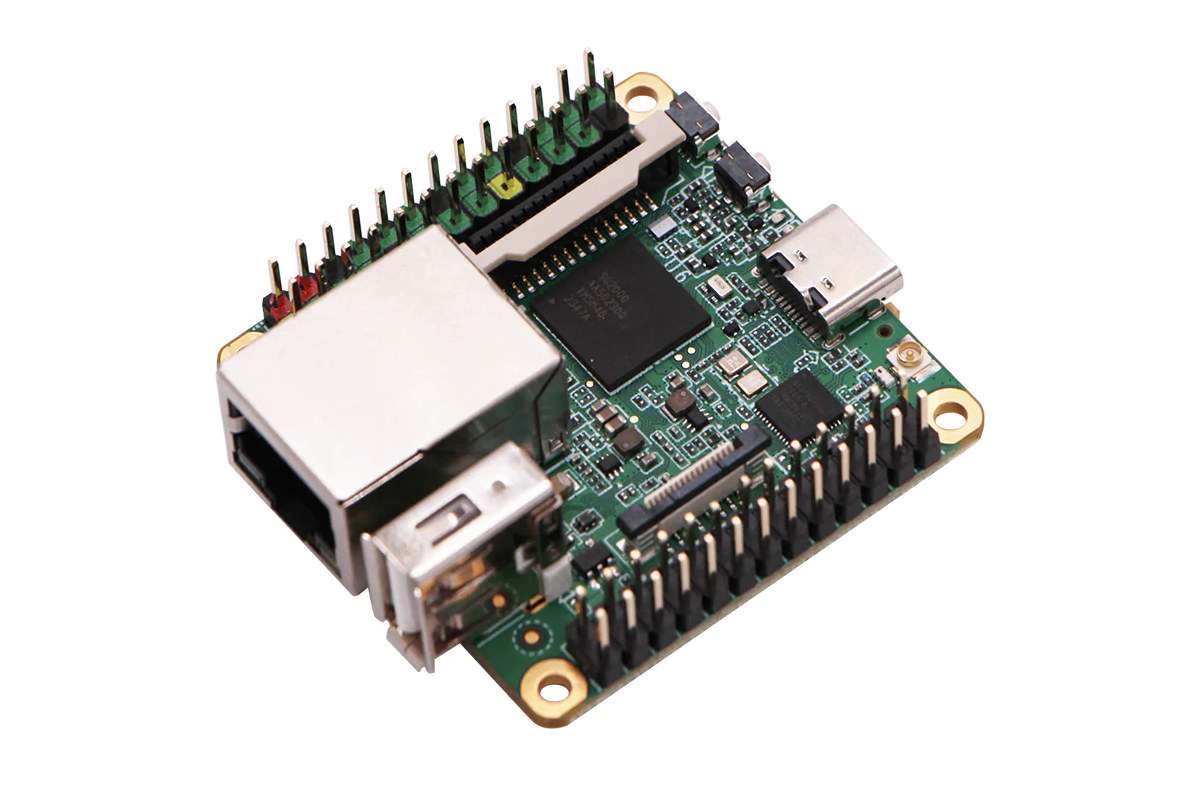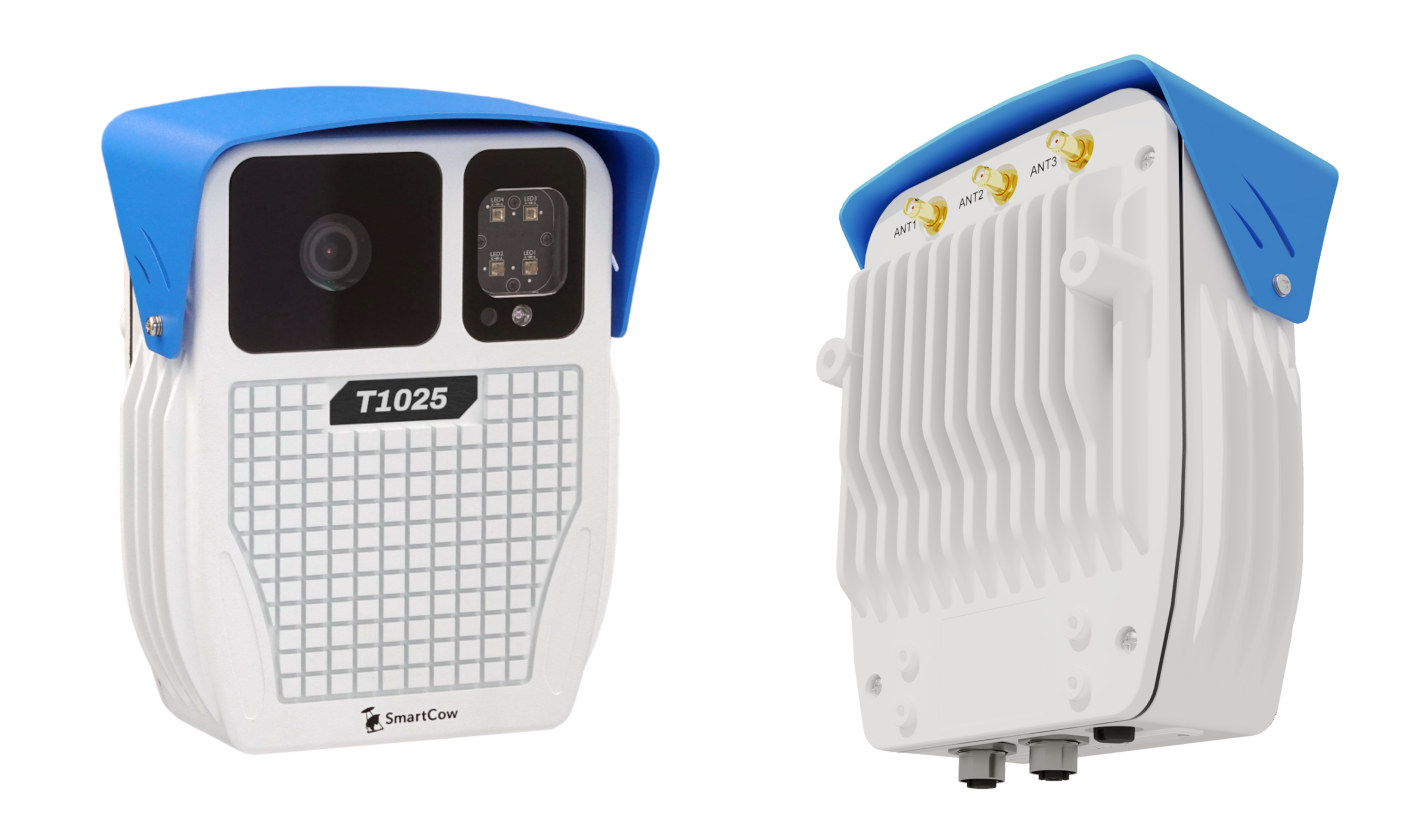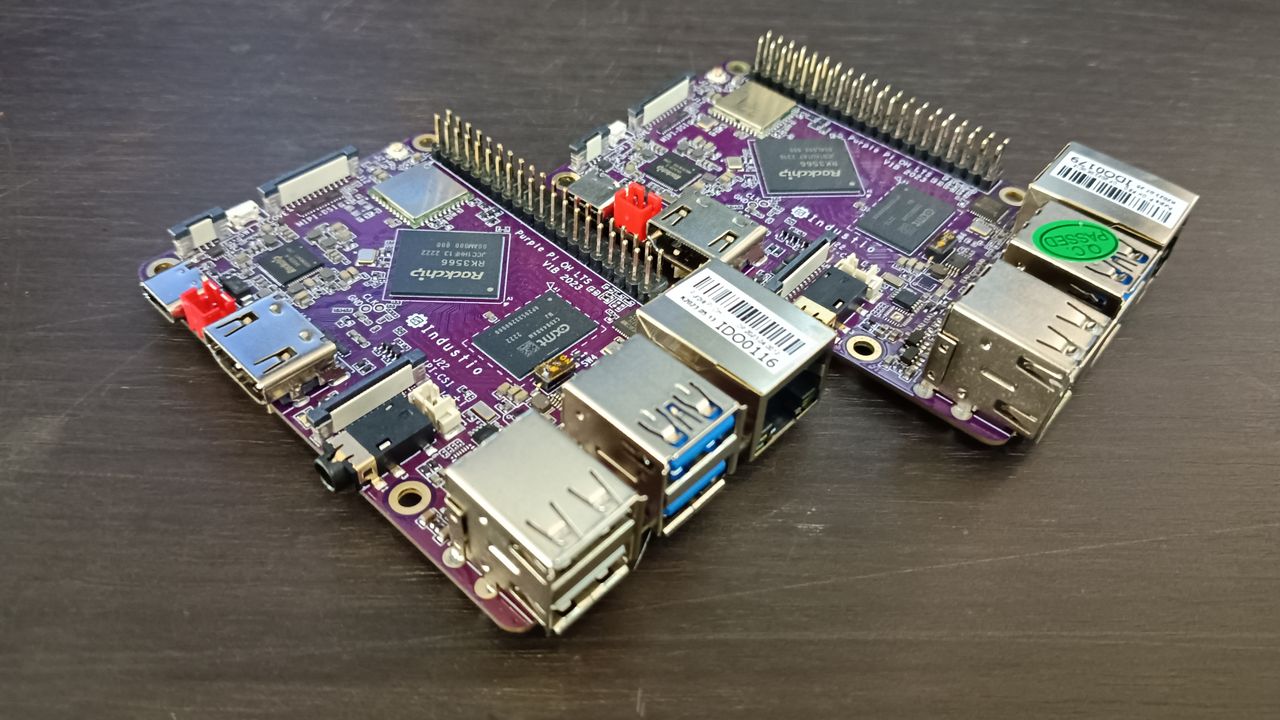AAEON BOXER-8645AI is an embedded AI system powered by NVIDIA Jetson AGX Orin that features eight GMSL2 connectors working with e-con Systems’ NileCAM25 Full HD global shutter GMSL2 color cameras with up to 15-meter long cables. The BOXER-8645AI is fitted with the Jetson AGX Orin 32GB with 32GB LPDDR5 and 64GB flash and up to 200 TOPS of AI performance. Other features include M.2 NVMe and 2.5-inch SATA storage, 10GbE and GbE networking ports, HDMI videos, and a few DB9 connectors for RS232, RS485, DIO, and CAN Bus interfaces. The embedded system takes 9V to 36V wide DC input from a 3-pin terminal block. AAEON BOXER-8645AI specifications: AI accelerator module – NVIDIA Jetson AGX Orin 32GB CPU – 8-core Arm Cortex-A78AE v8.2 64-bit processor with 2MB L2 + 4MB L3 cache GPU / AI accelerators NVIDIA Ampere architecture with 1792 NVIDIA CUDA cores and 56 Tensor Cores @ 1 GHz […]
Qualcomm RB3 Gen 2 Platform with Qualcomm QCS6490 AI SoC targets robotics, IoT and embedded applications
Qualcomm had two main announcements at Embedded World 2024: the ultra-low-power Qualcomm QCC730 WiFi microcontroller for battery-powered IoT devices and the Qualcomm RB3 Gen 2 Platform hardware and software solution designed for IoT and embedded applications based on the Qualcomm QCS6490 processor that we’re going to cover today. The kit is comprised of a QCS6490 octa-core Cortex-A78/A55 system-on-module with 12 TOPS of AI performance, 6GB RAM, and 128GB UFS flash connected to the 96Boards-compliant Qualcomm RBx development mainboard through interposer, as well as optional cameras, microphone array, and sensors. Qualcomm QCS6490/QCM6490 IoT processor Specifications: CPU – Octa-core Kryo 670 with 1x Gold Plus core (Cortex-A78) @ 2.7 GHz, 3x Gold cores (Cortex-A78) @ 2.4 GHz, 4x Silver cores (Cortex-A55) @ up to 1.9 GHz GPU – Adreno 643L GPU @ 812 MHz with support for Open GL ES 3.2, Open CL 2.0, Vulkan 1.x, DX FL 12 DSP – Hexagon […]
Qualcomm QCC730 low-power Arm Cortex-M4F WiFi 4 SoC targets battery-powered IoT applications
Qualcomm has unveiled the “micro-power” QCC730 Arm Cortex-M4F dual-band WiFi 4 microcontroller for the IoT market that targets similar applications as the Espressif ESP32 microcontrollers but potentially at lower power consumption with claims of up to 88% lower power than “previous generations” making it suitable for battery-powered industrial, commercial and consumer applications. To highlight the low-power consumption, the company also mentions that QCC730 devices could become high-performance alternatives to Bluetooth IoT solutions with direct cloud connectivity. Qualcomm QCC730 specifications: CPU core – Arm Cortex-M4F @ 60 MHz Memory/ Storage 1.5 MB RAM, including 600KB for user app (On-chip RRAM (NVM) to host application without the need for an external NOR flash) 640 KB SRAM, including 260KB for user app XiP over QSPI Flash Wi-Fi Standards: 802.11b, 802.11g, 802.11n, 802.11a Spectral Bands: 2.4 GHz, 5 GHz Channels: 20 MHz Antenna Configuration: 1×1 Features: up to MCS3 Interfaces – Master I2C, 15x […]
Arm Ethos-U85 NPU delivers up to 4 TOPS for Edge AI applications in Cortex-M7 to Cortex-A520 SoCs
Arm has just Introduced its third-generation NPU for edge AI with the Arm Ethos-U85 that scales from 256 GOPS to 4 TOPS or up to four times the maximum performance of the previous generation Ethos-U65 microNPU, while also delivering 20% higher power efficiency. While previous Arm microNPUs were paired with Cortex-M microcontroller-class cores potentially embedded into a Cortex-A application processor, the new Ethos-U85 can be married with Cortex-M microcontrollers and Cortex-A application processors up to the Cortex-A510/A520 Armv9 cores. Arm expects the Ethos-U85 to find its way into SoC designed for factory automation and commercial or smart home cameras with support for the new Transformer Networks and the more traditional Convolutional Neural Networks (CNNs). The Arm Ethos-U85 supports 128 to 2,048 MACs with performance ranging from 256 GOPS to 4 TOPS at 1 GHz, embeds 29 to 267KB RAM, offers SRAM, DRAM, and flash interface for external memory, and up […]
Renesas AIK-RA4E1 and AIK-RA6M3 reference kits are designed for accelerated AI/ML development
Renesas AIK-RA4E1 and AIK-RA6M3 are two new development boards based on RA-series 32-bit microcontrollers. These new dev boards have multiple reconfigurable connectivity functions to accelerate AI and ML design and development time. Both boards appear similar, but the AIK-RA4E1 uses the R7FA4E110D2CFM MCU, features three Pmod ports, and has no Ethernet support. On the other hand, the AIK-RA6M3 utilizes the R7FA6M3AH3CFC MCU, has six Pmod ports, and includes Ethernet support. Both the boards support full-speed USB and CAN bus. Renesas AIK-RA4E1 and AIK-RA6M3 reference kits specifications (Consolidated): RA4E1 Microcontroller Features: Model: R7FA4E110D2CFM Package: 64-pin LQFP Core: 100 MHz Arm Cortex-M33 SRAM: 128 KB on-chip Code Flash Memory: 512 MB on-chip Data Flash Memory: 8 KB on-chip RA6M3 Microcontroller Features: Model: R7FA6M3AH3CFC Package: 176-pin LQFP Core: 120 MHz Arm Cortex-M4 with FPU SRAM: 640 KB on-chip Code Flash Memory: 2 MB on-chip Data Flash Memory: 64 KB on-chip Connectivity: One USB […]
Duo S RISC-V/Arm SBC features Sophgo SG2000 SoC, Ethernet, WiFi 6, and Bluetooth 5 connectivity
Shenzhen MilkV Technology’s Duo S is a tiny SBC based on the 1 GHz Sophgo SG2000 Arm Cortex-A53 and RISC-V SoC with 512MB DDR3 (SiP), Fast Ethernet, WiFi 6, and Bluetooth 5 connectivity, and a switch to select Arm or RISC-V architecture before powering the board. We already had covered SG2002 Arm/RISC-V boards with 256MB RAM, namely the LicheeRV Nano and Duo 256M, but for people needing more memory, the Duo S provides another option that also features two 2-lane MIPI CSI connectors, a USB 2.0 host port, and two 26-pin headers for expansion. Its form factor reminds me of FriendlyELEC’s NanoPi NEO and family powered by Allwinner processors that were introduced a few years ago. Duo S specifications: SoC – SOPHGO SG2000 Main core – 1 GHz 64-bit RISC-V C906 or Arm Cortex-A53 core (selectable) Minor core – 700 MHz 64-bit RISC-V C906 core Low-power core – 25 to […]
Smartcam T1205 – An IP65-rated AI camera with NVIDIA Jetson Orin Nano 40 TOPS system-on-module
SmartCow’s SmartCam T1025 is a powerful AI camera based on the NVIDIA Jetson Orin Nano 8GB system-on-module with 40 TOPS of AI performance. The camera features M12 connectors for gigabit Ethernet, power, and serial interface, and has been certified with an IP65 ingress protection rating for outdoor operation. The camera also comes with 256GB NVMe SSD for the OS (Jetpack 6.0) and data storage and supports 4G LTE and GPS connectivity through an M.2 module. The company also introduced the SmartCam T1023 model compatible with NVIDIA Jetson Nano and Jetson TX2 NX for applications that do not require as much processing power and/or memory as provided by the Jetson Orin Nano AI camera. SmartCam T1025 specifications: System-on-module – NVIDIA Jetson Orin Nano 8GB CPU – 6-core Arm Cortex-A78AE v8.2 64-bit CPU @ 1.5 GHz with 1.5 MB L2 + 4 MB L3 GPU – 1024-core NVIDIA Ampere GPU @ 625 […]
Review of Purple Pi OH – A Rockchip RK3566 SBC tested in 2GB/16GB and 4GB/32GB configurations
Hello, I am going to review the Purple Pi OH boards from Wireless-Tag. The Purple Pi OH is a single-board computer (SBC) mechanically compatible with the Raspberry Pi. They are designed for personal mobile Internet devices and AIoT devices, which can be used in various applications, such as tablets, speakers with screens, and lightweight AI applications. The manufacturer sent me two models. The first model is the Purple Pi OH, which is equipped with 2GB of memory and 16GB of storage space and supports 2.4GHz Wi-Fi. The second model is the Purple Pi OH Pro, equipped with 4GB of memory and 32GB of storage space. This board supports both 2.4GHz and 5GHz Wi-Fi. The other components of both devices are almost the same. They are powered by the Rockchip RK3566 chip, which integrates a quad-core Cortex-A55 processor up to 1.8 GHz, a Mali-G52 GPU from Arm for 3D graphics acceleration, […]


